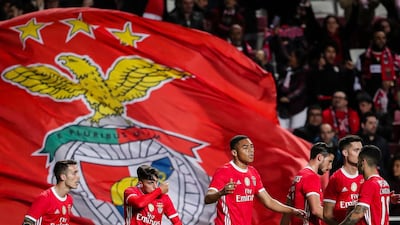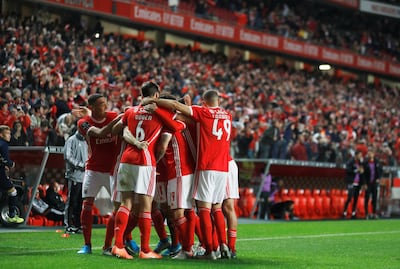Bernardo Silva, Joao Felix, Ederson, Andre Gomes, Fabio Coentrao, Nelson Semedo, Nemanja Matic, Renato Sanchez, Ramires, Axel Witsel, Rodrigo, Lazar Markovic, Enzo Perez, Victor Lindelof, Goncalo Guedes, Jan Oblak, David Luiz, Angel di Maria, Nico Gaitan, Ivan Cavaleiro, Nelson Oliveira and Joao Cancelo.
All have come through the system at Portuguese giants Benfica in recent years, all moved for a substantial profit of more than half a billion euros combined over the past decade. Selling your best players doesn’t always delight fans, but the players have been schooled to want to play at the highest level and the money from their inevitable sales is pumped back into the youth academy. The cycle ensures Benfica remain the best in their country and regulars in the lucrative Champions League.
“Joao Felix was a very technical player, not very strong physically but he had a big instinct for the game,” explains Luis Araujo, the under 19s coach of the player sold for €126 million (Dh513m) to Atletico Madrid last year after his seemingly implausible release clause was met. Aged 19, he became the third most expensive player in history. “We knew that he was different because he could see what was going to happen before his teammates and his opponents. He was shy, but what a player!”
“He’s a great kid,” adds Pedro Marques, Benfica’s technical director who returned to Portugal after eight years working with Manchester City’s first team and also co-ordinating their youth teams. “He progressed very quickly with his talent and work ethic and he did that with the right personal and social support. He’s another one from here for the top level.”
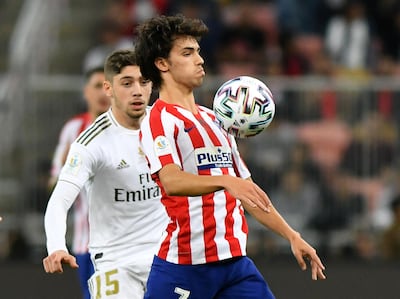
“Bernardo Silva was in a different position but the same character,” states Araujo of the Manchester City player, who is fluent in three languages. “Very intelligent player and a sociable person with good character. This is important at Benfica.”
It’s evident at the training ground where young players, who play 4-3-3 from the age of eight to the first team, shake the hands of visitors.
“We develop players to win and our philosophy is to play attacking football,” says Araujo. “We want to control the game with the ball. To get the ball we press a lot and defend as little as possible. We do this with very technical players who want to control the opponent and dominate the game. We do this from the under eights to the first team.”
Midfielder Gedson Fernandes moved to Tottenham Hotspur on loan last week. Ruben Dias or Florentino Luis might be the next to take in new surroundings, graduating from an academy that was voted the best at a recent awards ceremony in Dubai. But Benfica are even smart when things don’t work out. Last week they sold a striker to Espanyol who had not scored a single goal after signing for €20 million last year.
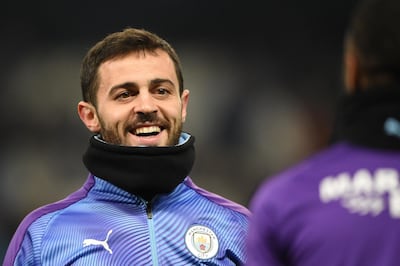
The struggling Catalans hope Raul de Tomas will end that famine to keep them in La Liga. For Benfica they recovered what they paid for him from Rayo Vallecano with the promise of an extra €2 million based on performances and a 20 per cent guarantee of any future transfer fee from the Spanish club which routinely sells its best players. It’s not the first time. With David Luiz, they sold the defender to Chelsea for €25 million with Nemanja Matic coming the other way, then they sold Matic for €25 million ... to Chelsea.
Chief executive Domingos Oliveira says: “Our core business is to find the best players at an early stage.” Benfica seldom buy players over the age of 25; they can’t compete with richer clubs, so they make youth a priority.
But how and why do they do it? How are they consistently so good at creating talents which football’s richest clubs are prepared to pay a premium for and why sell so many of their top prospects?
At the start of the century their rivals Sporting Club had the best academy in Portugal. Cristiano Ronaldo, Ricardo Quaresma and Nani came through. Before that, Porto had the best youth systems. Getting level and ahead was and is Benfica’s primary motivation, but football’s super clubs will buy from all three with confidence.
Sporting still do well. Manchester United fans have spent much time contemplating the arrival of their midfielder Bruno Fernandes, but Benfica's football factory is the best.
“A lot of it goes back to 2006 when our president [Luis Felipe Vieira who has been voted in five consecutive times] decided that the youth system had to become a priority,” Araujo says of Benfica’s football campus opened by club legend Eusebio in 2006. Laden with debt after the construction of their stadium, it wasn’t as if Benfica could spend their way out of trouble.
Araujo describes his main role as getting players ready for the first team. The preparation is done at Benfica’s campus, located across the River Tagus from central Lisbon in Seixal; there are nine pitches and accommodation for 80 boys from the age of 14. It’s a stable, long term project.
There are simulators to test reaction speeds and a Footbonaut where players receive the ball and have to pass to a moving target inside a circle.
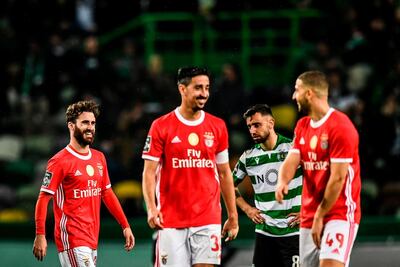
“But other clubs have great facilities too,” says Araujo. “What we do is scout the best players and have the best coaches. We develop players our way and believe it’s a good way to getting players towards a high level of competition.”
Their way is working. Benfica reached the final of the Uefa Youth League in 2014 and 2017, a competition they have played more games in than any other club. Porto, their domestic rivals, are the current holders. Portugal’s population is only 10 million and its football league can’t compete financially with Europe’s biggest five leagues, but standards are high in Portugal and domestically, younger teams play full on derbies against arch rivals Porto and Sporting at every age group.
“Our players are disciplined, educated and we get to know them really well,” says Araujo. “Some live inside our academy. They become our family. And they want to play for the biggest and best club in Portugal.”
Benfica have other advantages, like close connections with South America – not a continent renowned for its shortage of football talent. They had scouts there before the major clubs and could act decisively when then saw prospective talents. They acknowledge that all the big clubs now know the top 50 South American youngsters, but are Real Madrid going to play them in the first team like Benfica would?
Benfica have a name, too. The best team in the world in the early 1960s, they superseded the peerless Real Madrid side of the ’50s by winning the European Cup in 1961 and 1962. Led by their greatest ever player, Eusebio, they reached three more European Cup finals in the ’60s and the final in 1988 and 1990. The five final defeats still sting, but the club’s support at home is vast and the Portuguese diaspora and former colonies where they have more fans than in Portugal.
Benfica’s current average home crowd is 54,203 in a stadium which holds 64,000. Porto, the second best supported club, average 35,101. Benfica couldn’t afford to build their €250 million stadium when they did in 2001 and their annual revenue was €40 million, but credit was easier then and the decision was vindicated. The Estadio da Luz has been a success.
They Are the biggest club in football-mad Portugal, the reigning European champions.
“We’re a small country but we live and breathe football,” says Araujo. “We make footballers, not really basketball or handball players. Kids want to be professional footballers and it helps that Benfica is the most important club in Portugal – we estimate that 60 per cent of the country supports us. That helps.”
The location is hardly a hindrance. Lisbon is an attractive, sunny and well-connected city. Madonna (whose son is at Benfica’s academy) and Eric Cantona have made their homes in the city.
Benfica’s youth alumni list is an impressive one.
"I played at Benfica for 15 years and during this time there were many players who graduated from the academy to the first team," Brazilian defender Luisao tells The National. "These players may have had different characteristics, but what all of them had in common was a desire to work and to be successful. The coaches at the academy have done a great job ensuring that talented players are nurtured and developed in the best way. Benfica Campus has played a very important part in the success that Benfica has enjoyed over the last decade. I'm sure that this will continue."
It will happen because unlike at other top clubs, top-of-the-table Benfica create space for it to happen.
“The purpose here is very clear,” says Marques. “We want to develop players for the top level, to help them achieve their dreams. The academy is vital at the club, for driving sustainability for the club and also competitively of the first team.
“It sounds easy, but what we do is more than words. We put a lot of effort into what we do to make it reality. Also, we don’t develop only one kind of player either, but players with different characteristics.
Benfica’s system has four pillars.
“The first is access to best talent,” says Marques. “Our scouting network is key and when a youngster joins here aged 7, 8 or 9 it’s a long journey to the first team – 5-10 years. We scout in Portugal from a young age. We have five talent centres across the country. They can stay living with their families and develop with Benfica’s methodology. They will come to Lisbon if they are selected at 14.”
A lot of Portugal’s national team players came through at Benfica.
“The majority of our teams and the cores of our teams are composed from Portuguese,” said Marques. “Maybe 20 per cent come from abroad, but that’s later and with Fifa rules, players from outside Europe can only move at 18. A Brazilian can only join us at 18 and maybe go into the under 19s, 23 or B team. That will only be a player who will add to our roster.”
Japanese goalkeeper Leo Brian Kokubo joined as soon as he was 18 in 2019. He follows Ederson, who moved to Benfica then was loaned out to Ribereirao and then Rio Ave before playing for Benfica’s B team. The shared language is very important for Brazilian players, while Spanish-speaking South Americans find it easy to settle. Goalkeeper Ederson was sold to Manchester City for £35 million in 2017 after winning the Portuguese league-and-cup double with Benfica.
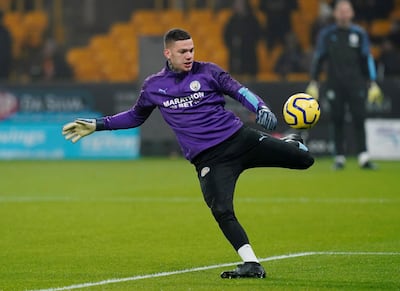
The second pillar is the methodology.
“When we have the players it’s all about what we do with them, the methodology,” explains Marques. “We want not only good players but top people. Our approach is very individualised to develop their needs. We help their technical and physical side, but also their education and social development away from the pitch. We have links with local schools and the players who study there have more time for training.
“These kids need to play, play and play and we select the competition for them to get the right challenge. They have to be challenged. That might mean a very talented footballer playing above his age group.
“We also don’t just develop one type for one position at Benfica. We have so many who’ve left here to play in a whole range of leagues around the world. We prepare them well.”
Offering first team opportunities, is, Marques points out, key. “That’s difficult. There has to be alignments between the squads, not just in training and letting players train with the first team but them actually playing. This is the last step into professional football. Someone can have a lot of talent but if they don’t have the chance to play then they hit a wall and they will leave to go somewhere else.”
The step between that first team experience is also important. Benfica’s B team play in Portugal’s second tier Liga Pro. It’s hard and they are currently 13th, yet those young players are playing against experienced professionals working for their win bonus to support their families.
“They’re playing against men, it’s real football,” says Marques. They’re also in front of four figure crowds where the opposition fans really want to bring down Benfica. They have to deal with the outside media, too, rather than the soft-soaping from in-house media.
“The Portuguese league is not La Liga or the Premier League and we don’t have a squad of top international stars like Barcelona or Real Madrid, but that means we have more space to bring players though.”
Benfica are top of the league having won 16 of their 17 league games. They have conceded only six goals and beat rivals Sporting 2-0 away on Friday.
“Benfica is also still a top club and the players feel that,” says Marques. “We had an open training session where 30,000 attended. Players here are in a winning, demanding team. Benfica are required to fight for the title every year. If a player moves from here to Barcelona or Real Madrid then they will have the same demands and the players will have the qualities.”
It is obvious why it is the finest finishing school in football.
